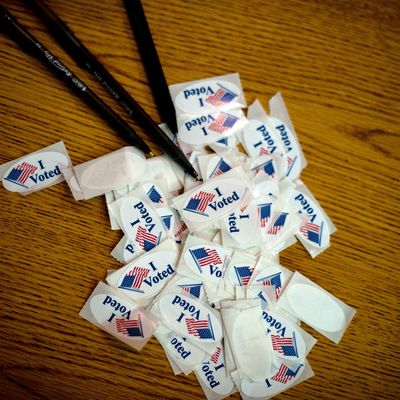
It’s an issue embedded in the controversy before the Supreme Court today involving Ohio’s practice of purging the voter-registration rolls of anyone who doesn’t vote in two consecutive elections and then doesn’t answer a piece of mail asking for an address confirmation (or doesn’t subsequently vote in two additional elections). A federal law clearly prohibits disqualifying voters solely for not voting. But is there a right not to vote strong enough that nonvoting shouldn’t trigger any procedure leading to disenfranchisement?
That is certainly what Justice Sonia Sotomayor suggested during questioning of Ohio’s state solicitor in oral arguments today in the case of Husted v. A. Philip Randolph Institute:
You can use the Post Office…. You can use Certified Mail. You could use juror change of addresses. You can use driver license, motor vehicle change of addresses. There are dozens of other ways that you could verify a change of address, yet you’re suggesting that using a failure to appear at an election or elections as evidence of moving when people have a right not to vote if they choose. Many have.
Paul Smith, who represents the challengers to Ohio’s voter purge system in this case, argued that the First Amendment implicitly includes a right not to vote. Chief Justice Roberts disagreed:
[T]here are many democracies that require you to vote, right? Australia, it’s – you get a fine if you don’t vote. And other places. And I have certainly seen it proposed it would be a good idea, given the low voter turnouts in our country, that we adopt something like that as well. Now, you think that would be unconstitutional?
Smith did, though he didn’t really get the opportunity to expound on that belief as the arguments drifted elsewhere. But it could be the key to cases like this, where the state deems keeping accurate registration rolls important enough to treat nonvoting as a signal that a voter may have moved.
Why might this right not to vote matter to those of us who are interested in the right to vote? It’s pretty simple: The minority voters who have traditionally suffered from discrimination in exercising the right are also less likely than average to participate in non-presidential elections. So any procedure that makes missing a midterm or off-year election automatic grounds for an address-confirmation inquiry that must be not only received and understood but responded to on pain of being dropped from the rolls is going to disproportionately affect those same vulnerable voters.
Most news accounts of the oral arguments in the Husted case suggested that Justice Kennedy’s friendly questioning of Ohio’s attorney and Justice Breyer’s clearly expressed sympathy for the state’s interest in keeping voter rolls accurate were a sign the Supreme Court was likely to rule against the law’s challengers. That’s actually hard to say, particularly since Paul Smith did a creditable job of answering Breyer’s concerns by showing evidence that most voters receiving notices like those mailed out by Ohio just toss them in the trash, making response or nonresponse irrelevant to the voter’s actual residence. It’s also entirely possible that the case can be decided on narrow grounds of statutory interpretation involving the federal law directly in question.
But the Court could get to the heart of the matter simply by asserting that anyone’s decision not to vote alone shouldn’t put one’s right to vote on a short track to extinction. Otherwise state election officials, especially in Republican-governed states where the people in charge are hardly interested in maximizing voting opportunities for habitually Democratic groups in the electorate, will keep finding ways to make the right to vote a use-it-or-lose-it proposition.






























